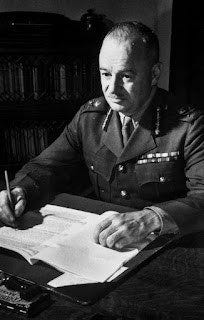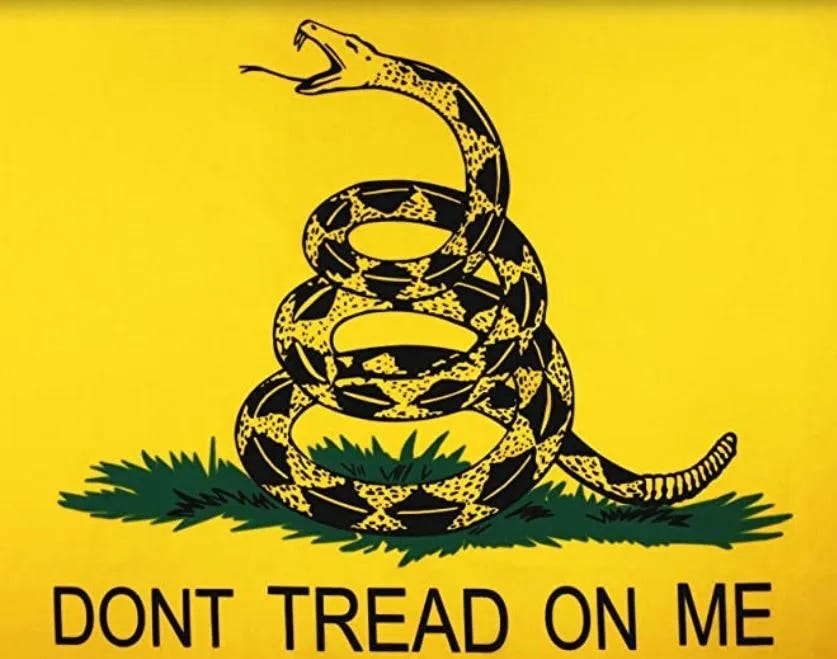Crazy Chisholm
Chisholm is one of many of the founding fathers of modern psychology. The psychiatric "leaders" wish to re-educate the population using mind games to create a new breed of amoral people.
...the pretense is made, as it has been made in relation to the finding of any extension of truth, that to do away with right and wrong would produce uncivilized people, immorality, lawlessness and social chaos. The fact is that most psychiatrists and psychologists and other respected people have escaped from moral chains and are able to think freely.
George Brock Chisholm1
Words 1,684 | Read Time 8 min | Enjoy
Introduction
George Brock Chisholm (1896-1971) was a Canadian medical doctor and military leader born in Oakville, Ontario. He joined the Canadian Army’s 15th Battalion during the First World War, serving in various roles, including cook, sniper, machine gunner, and scout. His leadership and calm under pressure earned him a Military Cross for heroism in France. After returning to Canada in 1917, he pursued his passion for medicine, earning an M.D. from the University of Toronto and specializing in psychiatry in England.
Chisholm’s interest in human emotion and mental health led him to the Yale School of Human Relations in 1931, where he focused on children’s mental health. He believed children should be free from previous generations’ prejudices and false concepts. During the Second World War, Chisholm returned to the military to study the psychological aspects of soldier training and rose to become Director-General of Medical Services for the Canadian Army.
Chisholm co-founded the World Federation of Mental Health with British psychiatrist John Rawlings Rees in 1940. Chisholm advocated for reinterpreting moral concepts and believed psychiatrists should lead this effort. In 1944, he was appointed Canada’s first Deputy Minister of Health. In 1945, he urged mental health professionals to help develop a new kind of human being to adapt to societal changes.
He believed a worldwide socialist order was necessary for human progress and saw the United Nations, particularly the World Health Organization, as key instruments in achieving this vision. Critics have labeled him a Marxist or Communist, but Chisholm remained committed to believing in a more equitable world.
George Brock Chisholm
George Brock Chisholm (1896-1971) was born in Oakville, Ontario, and he joined the Canadian Army’s 15th Battalion during the First World War. He served as a cook, sniper, machine gunner, and scout, and his leadership skills and calm demeanor under pressure brought him honor, including a Military Cross for heroism at a battle in France. In 1917, returning to Canada as a legend, he decided to pursue medicine, which had been his passion since he was a child. His fascination with human emotion brought him to prominence during World War II.
Chisholm earned an M.D. from The University of Toronto and specialized in psychiatry during an internship in England. After working six years as a general practitioner, in 1931, he studied at the Yale School of Human Relations, where he focused on children’s mental health. He concluded that:2
Children must be free to think in all directions irrespective of the peculiar ideas of parents who often seal their children’s minds with preconceived prejudices and false concepts of past generations. Unless we are very careful, very careful indeed, and very conscientious, there is still great danger that our children may turn out to be the same kind of people we are.
After his Yale studies, Chisholm returned to the Canadian military to study the psychological aspects of soldier training in the Second World War. He quickly rose to the post of Director-General of the Medical Services of the Canadian Army. In 1940, leading British psychiatrists John Rawlings Rees and Chisholm co-founded the World Federation of Mental Health (WFMH). Chisholm proclaimed their goal was the “The reinterpretation and eventually eradication of the concept of right and wrong” 3 and declared, “If the race is to be freed from its crippling burden of good and evil it must be psychiatrists who take the original responsibility.” ”4 In 1944, the Canadian Government appointed Chisholm to the newly created Deputy Minister of Health post. In 1945, Chisholm told the American Psychiatric Association:5
We have swallowed all manner of poisonous certainties fed us by our parents, our Sunday and day school teachers, our politicians, our priests, our newspapers and others with a vested interest in controlling us.... The results... frustration, inferiority, neurosis and inability to enjoy living, to reason clearly or to make a world fit to live in.” He urged psychologists and psychiatrists to become leaders in the “planned development of a new kind of human being” and added: “Without the extensive help of psychologists and psychiatrists it is quite probable that mankind will not long survive the fearful changes which are taking place.
Chisholm is one of many of the founders of modern psychology. The psychiatric “leaders” wish to re-educate the population using mind games to create a new breed of amoral people: their goal — a worldwide socialist order. Concerning part one, they have succeeded, as Bill Clinton is the quintessential example of amorality. For part two, their weapon is holding the threat of incarceration in mental facilities for those who do not conform to their concept of a socialist world order.
Throughout his career, Chisholm was obsessed with right and wrong. He also disdained the images of love of country and parental morality instilled in children. He proposed that psychotherapy work to eradicate the idea that man has the right to defend his private property. Specifically, in the February 1946 edition of Psychiatry, he wrote:6
There must be an opportunity to live reasonably comfortable for all the people in the world on economic levels which do not vary too widely either geographically or by groups within a population. This is a simple matter of redistribution of material wealth… Even self-defense may involve a neurotic reaction when it means defending one’s own excessive wealth from others who are in need.
At least Chisholm was honest about what he wanted — comprehensive overarching socialism. This ilk may have good intentions, as they genuinely wish everybody had most things handed to them. The problem is that socialism has never worked and never will work. If everybody has an assurance that the state provides for all needs, who will desire to work toward producing what everybody needs? Collectivism leads to slavery to create the necessities of life. This concept also explains why the socialist governments of Canada, England, and Australia have made it illegal for men to defend their property (i.e., gun elimination). Look out, USA, we were on the path to the same horrors. Everybody will be equal but equally miserable, except for our lousy “leaders.” Back to the future, it is more like a marriage between big businesses and the Leviathan government hidden in plain sight (under the rubric of public-private partnerships). Under Mousilini, it was the other “F” word.7
Chisholm and his associates have been working diligently for a worldwide socialistic system, and their prime instrument is the United Nations. So, Chisholm found his way to become the leader of the World Health Organization, an organ of the United Nations. He was one of the first public figures in Canada to emphasize the dangers of pollution and overpopulation.8
In a typical left-wing sandwich smear move, the Wikipedia website says, “Religious and other conservative writers and groups have accused Chisholm of being a Marxist or a Communist or subversive.” Nevertheless, we know socialism is just one of many forms of collectivism located in the same parking lot as Marxism.
Conclusion
George Brock Chisholm’s career was marked by his contributions to medicine, psychiatry, and military service. His early heroism in World War I and subsequent dedication to medical and psychiatric advancements showcased his commitment to understanding and improving human behavior. Chisholm’s work in children’s mental health, his role in the Canadian military during World War II, and his co-founding of the World Federation of Mental Health reflect his belief in the necessity of psychological insight for societal progress. However, his controversial views on morality, wealth redistribution, and the role of psychiatrists in shaping society have sparked significant debate. Chisholm’s advocacy for a worldwide socialist order, particularly through his leadership in the World Health Organization, has been met with both support and criticism. His legacy remains complex, illustrating the tension between ideas for societal “improvement” and the contentious methods proposed to achieve them. 📕
Puff Piece Parting Shot
I warmly encourage you to consider becoming a paid subscriber if you have the means. Tips are appreciated, too. Regardless of your choice, your support is deeply appreciated. From the bottom of my heart, thank you for your invaluable support!
The Reestablishment of Peacetime Society, G. B. Chisholm
None Dare Call It Treason 25 Years Later pg. 221, reference to Psychiatry, Feb. 1946
Under Benito Mussolini, the business-government ideology was characterized by corporatism, aiming to create a partnership between the state and various economic sectors to achieve national objectives. This ideology envisioned Italy as a “corporate state” where the economy was organized into corporations representing different sectors, integrating syndicates and employer organizations into the government structure. Although private property and capitalism were retained, the state exerted significant control over economic activities, directing production, pricing, and investment to serve national goals, particularly militarization and self-sufficiency. Fascist corporatism sought to eliminate class struggle by promoting collaboration between workers and employers within each corporation, with the state acting as an arbitrator to maintain harmony. Independent labor unions were banned, and strikes were illegal, with state-controlled syndicates replacing independent unions. The regime pursued economic autarky to reduce reliance on imports, promoted public works and infrastructure projects to stimulate the economy, and used propaganda to promote nationalism, convincing citizens that economic sacrifices were necessary for the nation’s resurgence. Additionally, the state established corporations in strategic sectors to control and manage key industries directly. This controlled economy aimed to suppress individual and class interests in favor of a unified national purpose.









It never ends...
I pulled in the reins when the article reported that Chisholm returned to Canada in 1917. If the writer erred in reporting that date, and he returned at the end of the war (late 1918-1919, then a reasoned discussion of his views can proceed. (The writer does not mention whether he might have been injured enough that he could not return to combat.) However, I presume that the author researched the article and accurately reported that Chisholm returned home while thousands were still on their way to the fighting, without physically mitigating circumstances.
This suggests to me either some form of shirking duty (the worthiness of that War to End All Wars not part of the present discussion) or mental dislocation, such as PTSD. In this case, any paradigm shift is suspect, and even returning from the war honorably may have contributed to a rejection of traditional thought patterns. In the cases of C.S. Lewis and G.K. Chesterton, traumatic WWI war experiences led to deeper understanding of humanity's corruption and eventually to their powerful understanding of God's place and His authority to establish His moral authority. Unfortunately for Chisholm and for us, that part of the twentieth century was infused by the godless ideas of people like Neitszche and Freud, and gave currency to the godless amorality of the Lenins, Stalins, and Hitlers of the rest of the century and beyond. Contemporaneously, the Judeo-Christian concept of legitimate morals in a legitimate moral system was tossed out with the bathwater as claims by "science" that God had been debunked gained acceptance. For the most part, the world has yet to recover a proper understanding of God and why morality stands where "amorality" must fall.